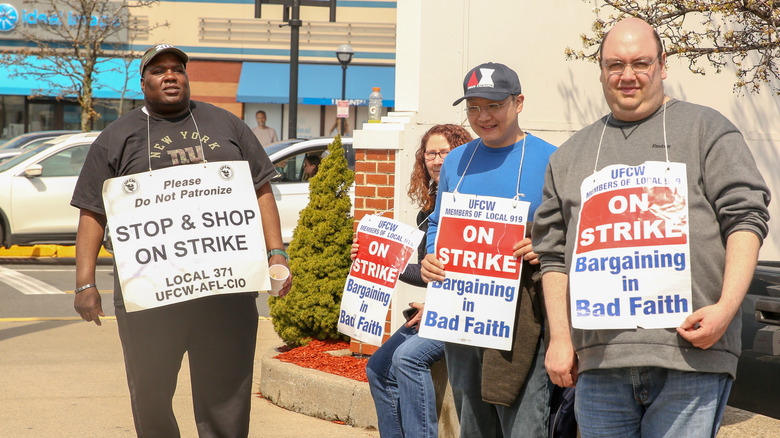Why Overworked Grocery Employees Have More Power Than Ever
As service industry and retail employers struggle to fill jobs (CNBC reports that openings outnumbered available workers two to one in May), current retail employees are looking to take advantage of this newfound leverage. Similar to the movements to unionize at Starbucks locations across the country, retail workers at some Amazon, Apple, and Trader Joe's locations are now pushing for increased pay and benefits.
According to Grocery Dive, grocery workers have become frustrated as more demands are put on them from employers as fallout from "the great resignation" — prompted largely by the Covid-19 pandemic, which resulted in increased danger at these low-paying jobs — has left many stores with vacancies. It's a situation Colorado grocery union leader Kim Cordova told Grocery Dive her people were able to leverage to get multi-dollar per hour raises for employees at their King Soopers stores.
Cordova's team isn't alone, existing grocery unions in California, Oregon, Massachusetts, Rhode Island, and Connecticut have also used the lack of new employees to leverage more pay and benefits from their stores this year, according to the Grocery Dive report.
While many employees at larger chains like Kroger and Albertsons — which own brands, including Safeway, Vons, Food 4 Less, Jewel Osco, Mariano's, Fred Meyer, QFC, and King Soopers (per Grocery Story) — are already union members, employees of smaller chains like Trader Joe's are now looking to gain similar leverage. According to Truth Out, the Trader Joe's store in Hadley, Massachusetts will hold the chain's first unionization vote on July 27 and 28.
Dangerous working conditions
While retail employees are beginning to use their employer's desperation for more workers to their advantage to improve benefits and pay, The New York Times reports their concerns are not just about money. Recent years have seen an increase in shoplifting and violence against employees, which has led to increased anxiety and job dissatisfaction.
While the pandemic brought with it new hazards, including the possibility of catching the virus before vaccines and treatments were unavailable as well as abuse by customers angry about safety mandates, it also brought increased pay to many employees. According to Grocery Dive, companies like Whole Foods increased wages by $2 per hour for employees working on the frontline during the initial shut-downs. However, as time went on, the temporary raises disappeared even though the virus didn't, leading to frustration amongst workers, many of whom the New York Times notes are still receiving more verbal and physical abuse from customers and who fear the possibilities of mass shootings like the ones in Boulder, Colorado in March 2021, and Buffalo, New York this May.
Kim Cordova, who also spoke to the New York Times, told the paper that along with the raises, her union negotiated workers the right to defend themselves against aggressive customers. This stands in contrast to the shop-lifter policies many stores have in place which prohibit employees from intervening, despite the fact that bottom lines damaged by shoplifting can mean employees are unable to get raises from large corporate stores.

